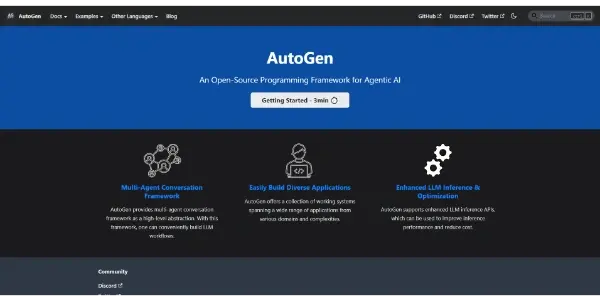AutoGen

An open-source framework from Microsoft for creating multi-agent systems based on LLMs. Easily develop complex AI applications, optimize inference performance and reduce costs thanks to enhanced APIs
AutoGen: A Deep Dive into Microsoft's Open-Source Multi-Agent Framework
AutoGen is a groundbreaking open-source framework developed by Microsoft, designed to simplify the creation and deployment of sophisticated multi-agent systems leveraging Large Language Models (LLMs). This tool empowers developers to build complex AI applications efficiently, optimize inference performance, and significantly reduce associated costs through enhanced APIs. It sits at the intersection of AI Agents, Developer Tools, and LLM models, offering a powerful and accessible platform for a wide range of applications.
What AutoGen Does
AutoGen facilitates the development of systems composed of multiple AI agents, each potentially employing different LLMs or other reasoning models. These agents can collaborate, compete, or simply interact to achieve a shared goal. Unlike building such systems from scratch, AutoGen provides a streamlined architecture, pre-built components, and flexible tools to manage the complexities of multi-agent interactions. This includes handling communication between agents, managing their execution flow, and monitoring their performance. The framework is specifically designed to handle the inherent challenges of scaling LLM usage, allowing for efficient resource management and cost optimization.
Main Features and Benefits
- Simplified Multi-Agent System Development: AutoGen abstracts away much of the underlying complexity of building and managing multi-agent systems. Developers can focus on defining agent roles and interactions rather than low-level infrastructure.
- Enhanced API for LLM Interaction: AutoGen provides a powerful and efficient API for interacting with various LLMs, streamlining the integration process and maximizing performance.
- Modular and Extensible Design: The framework's modular architecture allows for easy customization and extension with new agents, models, and functionalities. This ensures adaptability to evolving needs and technological advancements.
- Optimized Inference Performance: By efficiently managing communication and resource allocation among agents, AutoGen minimizes latency and improves overall system performance.
- Cost Reduction: Through optimized inference and resource management, AutoGen helps users significantly reduce the cost of deploying and running LLM-powered applications.
- Open-Source and Community Driven: Being open-source, AutoGen benefits from community contributions, fostering continuous improvement and innovation.
Use Cases and Applications
AutoGen's versatility makes it suitable for a broad spectrum of applications:
- Complex Problem Solving: Breaking down intricate problems into smaller, manageable tasks that individual agents can address collaboratively. Examples include financial modeling, scientific research, and software development.
- Chatbots with Enhanced Capabilities: Creating sophisticated chatbots capable of handling diverse requests by routing them to specialized agents equipped with the necessary knowledge and skills.
- Automated Workflow Orchestration: Automating complex workflows by assigning individual tasks to different agents, improving efficiency and reducing manual intervention.
- Game Development: Designing AI opponents or collaborators in games that exhibit more sophisticated and emergent behavior.
- Personalized Education: Building adaptive learning systems that tailor educational content and support to individual student needs.
Comparison to Similar Tools
While several other frameworks enable LLM interaction, AutoGen distinguishes itself by its explicit focus on multi-agent systems. Tools primarily focused on single-agent LLM applications lack the built-in mechanisms for managing communication, coordination, and resource allocation among multiple agents, which is the core strength of AutoGen. Other multi-agent frameworks may exist, but AutoGen’s open-source nature, comprehensive API, and emphasis on optimization set it apart.
Pricing Information
AutoGen is completely free to use. Its open-source nature ensures accessibility to a wide range of developers and researchers. While using LLMs will incur costs based on the providers’ pricing models, AutoGen itself does not have any licensing fees or subscription costs.
Conclusion
AutoGen represents a significant advancement in the field of LLM-based application development. Its focus on multi-agent systems, coupled with its open-source nature, optimized performance, and comprehensive API, makes it a powerful and versatile tool for building complex, efficient, and cost-effective AI applications across numerous domains. Its continued development and community support promise to further enhance its capabilities and solidify its position as a leading framework in the rapidly evolving landscape of AI.